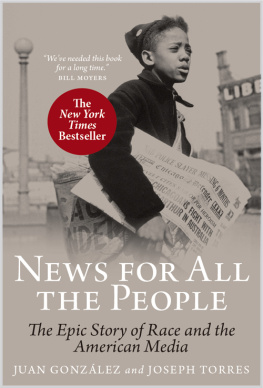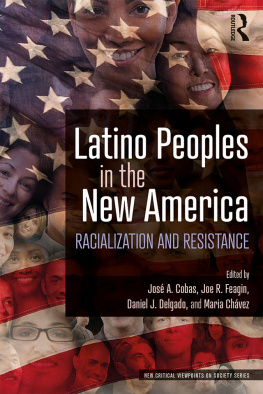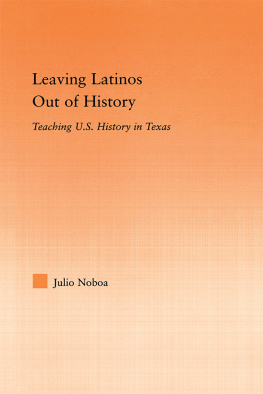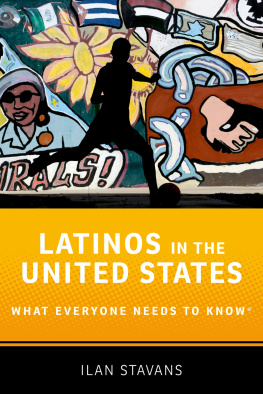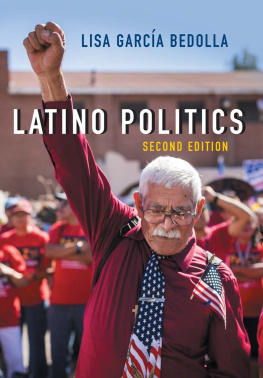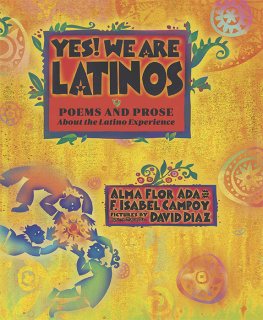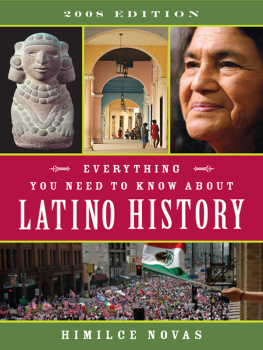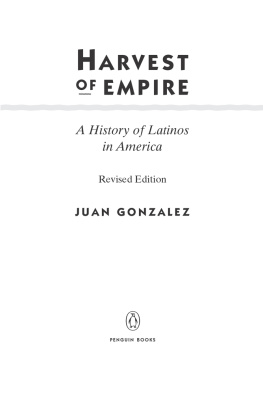Praise for Juan Gonzalezs
Harvest of Empire
A serious, significant contribution to understanding who the Hispanics of the United States are and where they come from.
The New York Times Book Review
A profound book with an equally profound message about the origins of Latino migration, domination, and colonization, and historical lessons not found in many American textbooks.
San Antonio Express-News
A compellingand enlighteningchronicle offers an insiders view of the rich and varied fabric of the people soon to be the largest minority in the United States.
The Miami Herald
Anyone who finishes Harvest of Empire will never again see Latinos as a monolithic group, but as a diverse society of citizens and future citizens, worthy of recognition and respect.
Fort Worth Morning Star
In what would seem an impossible task, journalist Juan Gonzalez tackles the entire history of Latinos in North and Central America in a single volume illuminating.
Dallas Morning News
Required reading, not simply for Latinos but for everyone.
The Kansas City Star
Gonzalezs ever-enjoyable prose grabs the reader and fills in the gaps left by a traditional American history education.
In These Times
Here at last is the extraordinary saga of the Latinos in North America, brilliantly and compactly told. All the descendants of the old immigrants should read this book, to remind themselves of where they came from, and where all of us are goingtogether.
Pete Hamill, author of Snow in August and A Drinking Life
This excellent history of Latinos in North and Central America is fair-handed, extremely well-documented, and filled with the sort of details that explain rather than enflame.
Publishers Weekly
Juan Gonzalez brings us a sweeping account of the raw quest for empire that shaped the New World and is finally in our time transforming the United States. The history is often brutal, the experiences of the people caught up in the process wrenching. But Gonzalez paints a canvas that is in the end profoundly optimistic, for in the Latinization of the United States he sees the possibility of a renaissance of American democracy.
Frances Fox Piven, coauthor of Regulating the Poor
PENGUIN BOOKS
HARVEST OF EMPIRE
JUAN GONZALEZ , a columnist with New Yorks Daily News, and a two-time winner of the George Polk journalism award, was named one of the nations one hundred most influential Hispanics by Hispanic Business, and has received a lifetime achievement award from the Hispanic Academy of Media Arts and Sciences. Born in Ponce, Puerto Rico, he grew up in a New York City housing project, graduated from Columbia University, and was a cofounder of the 1960s Young Lords. He lives in Manhattan.

A History of Latinos
in America
Revised Edition
JUAN GONZALEZ

PENGUIN BOOKS
PENGUIN BOOKS
Published by the Penguin Group
Penguin Group (USA) Inc., 375 Hudson Street, New York, New York 10014, U.S.A.
Penguin Group (Canada), 90 Eglinton Avenue East, Suite 700, Toronto, Ontario,
Canada M4P 2Y3 (a division of Pearson Penguin Canada Inc.)
Penguin Books Ltd, 80 Strand, London WC2R 0RL, England
Penguin Ireland, 25 St Stephens Green, Dublin 2, Ireland (a division of Penguin Books Ltd)
Penguin Group (Australia), 250 Camberwell Road, Camberwell, Victoria 3124,
Australia (a division of Pearson Australia Group Pty Ltd)
Penguin Books India Pvt Ltd, 11 Community Centre,
Panchsheel Park, New Delhi 110 017, India
Penguin Group (NZ), 67 Apollo Drive, Rosedale, Auckland 0632,
New Zealand (a division of Pearson New Zealand Ltd)
Penguin Books (South Africa) (Pty) Ltd, 24 Sturdee Avenue, Rosebank,
Johannesburg 2196, South Africa
Penguin Books Ltd, Registered Offices:
80 Strand, London WC2R 0RL, England
First published in the United States of America by Viking Penguin,
a member of Penguin Putnam Inc. 2000
Published in Penguin Books 2001
This revised edition published 2011
1 3 5 7 9 10 8 6 4 2
Copyright Juan Gonzalez, 2000, 2011
All rights reserved
LIBRARY OF CONGRESS CATALOGING-IN-PUBLICATION DATA
Gonzlez, Juan, 1947
Harvest of empire: a history of Latinos in America / Juan Gonzalez.Rev. ed.
p. cm.
Includes bibliographical references and index.
ISBN: 978-1-101-58994-6
1. Hispanic AmericansHistory. 2. ImmigrantsUnited StatesHistory. 3. United StatesEmigration and immigrationHistory. 4. Latin AmericaEmigration and immigrationHistory. 5. United StatesRelationsLatin America. 6. Latin America RelationsUnited States. 7. United StatesTerritorial expansionHistory. 8. United StatesEthnic relations. I. Title.
E184.S75G655 2011
973.0468dc22 2011006880
Printed in the United States of America
Set in TimesTen Roman
Except in the United States of America, this book is sold subject to the condition that it shall not, by way of trade or otherwise, be lent, resold, hired out, or otherwise circulated without the publishers prior consent in any form of binding or cover other than that in which it is published and without a similar condition including this condition being imposed on the subsequent purchaser.
The scanning, uploading and distribution of this book via the Internet or via any other means without the permission of the publisher is illegal and punishable by law. Please purchase only authorized electronic editions, and do not participate in or encourage electronic piracy of copyrighted materials. Your support of the authors rights is appreciated.
The scorn of our formidable neighbor who does not know us is Our Americas greatest danger. And since the day of the visit is near, it is imperative that our neighbor know us, and soon, so that it will not scorn us. Through ignorance it might even come to lay hands on us. Once it does know us, it will remove its hands out of respect. One must have faith in the best of men and distrust the worst.
Jos Mart,
January 10, 1891
Contents
14. Puerto Rico, U.S.A.: Possessed and Unwanted
Introduction
Between March and May of 2006, an estimated 3 to 5 million people, most of them Latinos, filled the downtown streets of some 160 U.S. towns and cities in the largest series of mass protests the nation had ever seen.
Not even during the heyday of the American labor movement in the 1930s, or during the high tide of civil rights protests and public opposition to the Vietnam War during the 1960s, had such astonishing numbers paraded peacefully in so many different localities over a common grievance. Never before had a group at the margins of U.S. society taken our political establishment by such complete surprise. Word of the mobilizations, it turned out, had spread largely via Spanish-language radio and TV and through social networks of young Latinos on the Internet, so government leaders and the general public had little idea of what was happening until the huge crowds suddenly started to appear on our city streets.
The immediate aim of the marchers was to defeat a bill in Congress that would establish tough new criminal penalties for immigrants who were in the country illegally. The opponents sought not only to derail what came to be known as the Sensenbrenner bill, but to replace it with a comprehensive overhaul of U.S. immigration policy, one that would include a path to citizenship for an estimated 12 million undocumented workers already in the country. Protest leaders framed their effort as a moral call for compassion and respect, for
Next page

